NCCU and UofSC Strengthen Dual-Degree Program Collaboration to Pave the Pathway to the Global Learning





Date :
2024-12-16
Department :
International Master's Program in International Communication Studies
【Article by IMICS】
On December 9-10, 2024, National Chengchi University’s (NCCU) College of Communication hosted a two-day event with its global partner, the University of South Carolina’s (UofSC) College of Information and Communications, to solidify the agreement of the dual-degree program. The two schools engaged in meaningful discussions on their shared interests in the fields of communication technology for future collaborative developments. This partnership seeks to strengthen the collaboration and enhance opportunities for students to study abroad, providing them with valuable insights into innovation in the digital age.
Dr. Jih-Hsuan Tammy Lin, director of the IMICS program, offered a brief introduction to the history of college of communication and the IMICS program. She praised the dual-degree program for its contribution to enhancing student recruitment and attracting outstanding international students from diverse disciplines. In addition, the collaboration with Meta to establish XR Hub at NCCU was particularly highlighted, demonstrating the school’s strong connection with leading technology companies. UofSC’s educational mission aligns with NCCU’s efforts to adapt to the rapidly changing media environment. Dr. Tom Reichert, the dean of College of Information and Communications at the University of South Carolina, then pointed out the emergence of information technology in recent years. He emphasized that USC, with its existing faculty expertise in AI and technology, is well-prepared to maintain its competitive edge.
In the afternoon, Dr. Trisha Tsui-Chuan Lin, the director of the Global Communication and Innovation Technology (GCIT) program, hosted the meeting with UofSC’s professors, highlighting the passion of collaboration between each other. During her presentation, Dr. Lin articulated the GCIT program's mission and value to advance education in new media and technology. The importance of cultural exchange was emphasized, too. What’s more, UofSC professors responded with enthusiasm, expressing their eagerness to contribute to student internships and further mutual learning. During the conversation, it not only underscored the shared commitment to fostering academic excellence but also showed the potential for interdisciplinary collaboration between the two institutions. Both Dr. Lin and the UofSC faculty recognized the profound impact such collaborations could have on students' educational journeys. Their perspectives shared a vision of leveraging soft power through education, ultimately aiming to enrich students' experiences and prepare them for global challenges.
On the morning of December 10, Dr. Tom Reichert delivered a significant speech on the evolving role of artificial intelligence (AI) in communication education. The need for universities to prepare students for an AI-augmented communication industry was emphasized as technological advancements are reshaping how professionals engage with their work types in journalism and advertising fields.
“We cannot do the education that we’ve done years ago,” he said. The urgency of updating curricula and teaching strategies to integrate new technologies have come to the surface. With AI now an integral part of communication workflows, traditional educational methods are unable to keep up with its rapid development. He argued that communication students must acquire new skills that are essential in a technology-driven world. Moreover, he encourages professors to embrace AI and face the reality of such an evolving media landscape in the digital age.
While there are challenges in using AI in a responsible manner, he urged that these concerns should not hinder progress. "We are still figuring out how to use AI professionally and responsibly," he acknowledges, but encouraged both educators and students to embrace AI as a necessary tool for innovation in the field. He called for a shift in curricula to ensure that communication graduates are not only skilled in AI technologies but also prepared to navigate the ethical complexities of their integration into the workplace.
Dr. Linwan Wu from UofSC delivered a speech about the dual degree program for students at NCCU. This inspiring program offers three distinct pathways for graduate students to choose from, tailored to their specific interests and research aspirations. A standout feature of this program is its exceptional and diverse faculty, which significantly enriches the educational experience.
The studios in USC are also appealing to prospective lots of students. During the insightful QA session, NCCU students passionately expressed their enthusiasm for the dual degree program, and the questions about housing and transportation were asked. The faculty's thoughtful and comprehensive responses alleviated student’s concerns, inspiring them to pursue their studies at USC with renewed ambition and determination.
Author: Monika Hung (IMICS second-year student) & Joyce Wang (IMICS first-year student)
On December 9-10, 2024, National Chengchi University’s (NCCU) College of Communication hosted a two-day event with its global partner, the University of South Carolina’s (UofSC) College of Information and Communications, to solidify the agreement of the dual-degree program. The two schools engaged in meaningful discussions on their shared interests in the fields of communication technology for future collaborative developments. This partnership seeks to strengthen the collaboration and enhance opportunities for students to study abroad, providing them with valuable insights into innovation in the digital age.
Dr. Jih-Hsuan Tammy Lin, director of the IMICS program, offered a brief introduction to the history of college of communication and the IMICS program. She praised the dual-degree program for its contribution to enhancing student recruitment and attracting outstanding international students from diverse disciplines. In addition, the collaboration with Meta to establish XR Hub at NCCU was particularly highlighted, demonstrating the school’s strong connection with leading technology companies. UofSC’s educational mission aligns with NCCU’s efforts to adapt to the rapidly changing media environment. Dr. Tom Reichert, the dean of College of Information and Communications at the University of South Carolina, then pointed out the emergence of information technology in recent years. He emphasized that USC, with its existing faculty expertise in AI and technology, is well-prepared to maintain its competitive edge.
In the afternoon, Dr. Trisha Tsui-Chuan Lin, the director of the Global Communication and Innovation Technology (GCIT) program, hosted the meeting with UofSC’s professors, highlighting the passion of collaboration between each other. During her presentation, Dr. Lin articulated the GCIT program's mission and value to advance education in new media and technology. The importance of cultural exchange was emphasized, too. What’s more, UofSC professors responded with enthusiasm, expressing their eagerness to contribute to student internships and further mutual learning. During the conversation, it not only underscored the shared commitment to fostering academic excellence but also showed the potential for interdisciplinary collaboration between the two institutions. Both Dr. Lin and the UofSC faculty recognized the profound impact such collaborations could have on students' educational journeys. Their perspectives shared a vision of leveraging soft power through education, ultimately aiming to enrich students' experiences and prepare them for global challenges.
On the morning of December 10, Dr. Tom Reichert delivered a significant speech on the evolving role of artificial intelligence (AI) in communication education. The need for universities to prepare students for an AI-augmented communication industry was emphasized as technological advancements are reshaping how professionals engage with their work types in journalism and advertising fields.
“We cannot do the education that we’ve done years ago,” he said. The urgency of updating curricula and teaching strategies to integrate new technologies have come to the surface. With AI now an integral part of communication workflows, traditional educational methods are unable to keep up with its rapid development. He argued that communication students must acquire new skills that are essential in a technology-driven world. Moreover, he encourages professors to embrace AI and face the reality of such an evolving media landscape in the digital age.
While there are challenges in using AI in a responsible manner, he urged that these concerns should not hinder progress. "We are still figuring out how to use AI professionally and responsibly," he acknowledges, but encouraged both educators and students to embrace AI as a necessary tool for innovation in the field. He called for a shift in curricula to ensure that communication graduates are not only skilled in AI technologies but also prepared to navigate the ethical complexities of their integration into the workplace.
Dr. Linwan Wu from UofSC delivered a speech about the dual degree program for students at NCCU. This inspiring program offers three distinct pathways for graduate students to choose from, tailored to their specific interests and research aspirations. A standout feature of this program is its exceptional and diverse faculty, which significantly enriches the educational experience.
The studios in USC are also appealing to prospective lots of students. During the insightful QA session, NCCU students passionately expressed their enthusiasm for the dual degree program, and the questions about housing and transportation were asked. The faculty's thoughtful and comprehensive responses alleviated student’s concerns, inspiring them to pursue their studies at USC with renewed ambition and determination.
Author: Monika Hung (IMICS second-year student) & Joyce Wang (IMICS first-year student)
